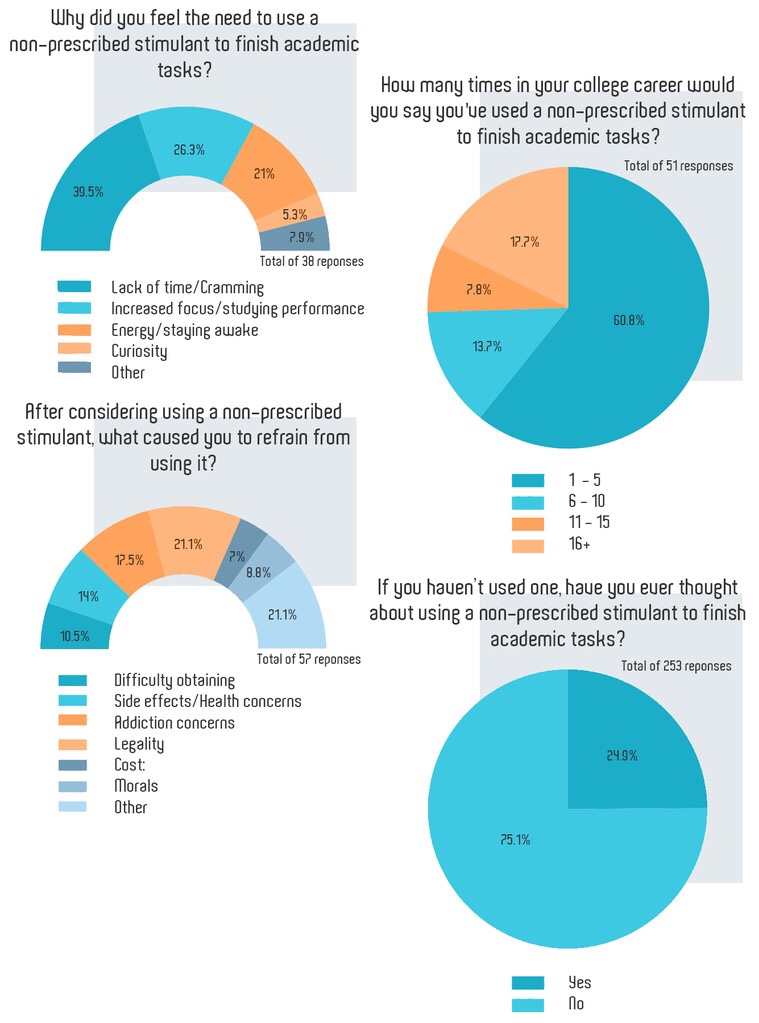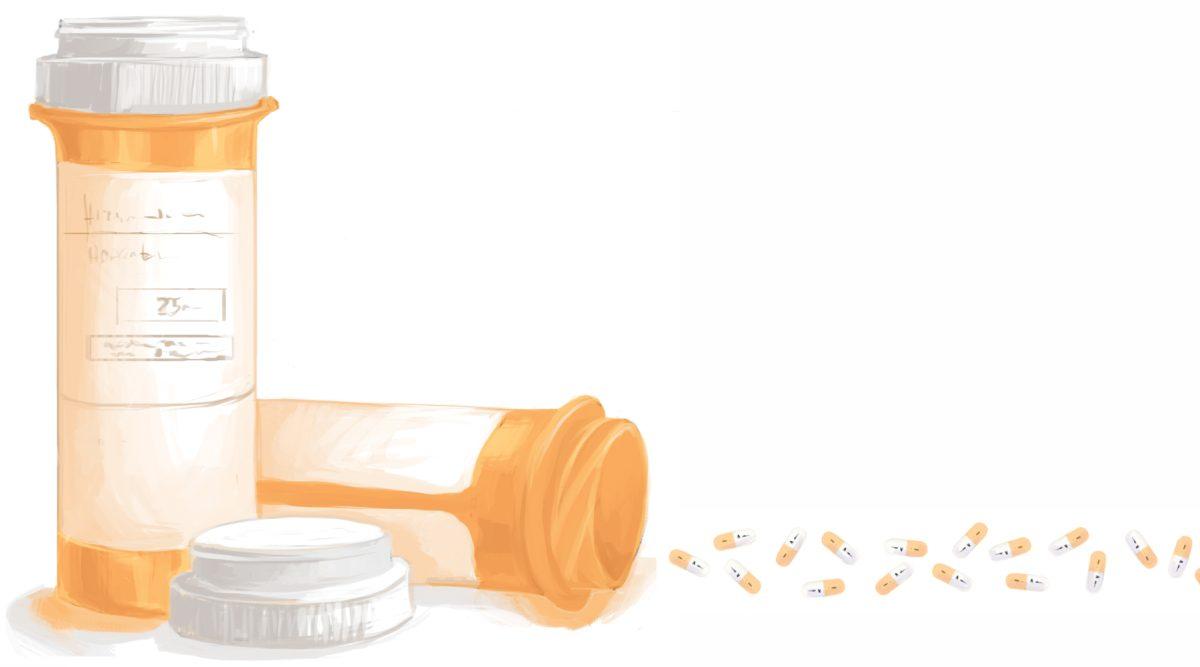Names of some sources have been changed to protect their identities due to legality concerns.
Max hesitantly popped a small capsule into his mouth and swallowed. It was the night before a big test, and he was studying with a friend — a friend who’d given him the pill.
Waiting for the effects of the medication to kick in, Max distracted himself with YouTube videos. One video led to another and Max remained hooked to his computer screen, forgetting he had to prepare for a test.
“I just got too into whatever I was doing,” Max said. “(My friend) was like ‘Dude, you’re on Adderall right now, you should start doing your homework.’”
That was Max’s first time using non-prescription Adderall to study for an exam. In a survey conducted by The Mercury, about 17 percent of the respondents, like Max, said they’ve used a stimulant medication without a prescription to finish school-related work.

Before Max, a finance senior, came to UTD, he attended UT San Antonio, where he was enrolled in a competitive pre-dental program. During his second semester as a freshman, Max was dismissed from the program for not maintaining the required GPA.
His parents still wanted him to go to dental school. As pressure built for Max to bring up his grades, he looked to Adderall — a stimulant that acts as a cognitive enhancer — to help concentrate on his studies.
“When I studied science, I didn’t really enjoy it because I felt like I wasn’t really learning. … So I would need an added boost to keep me interested and just keep me up for longer periods at night,” he said.
Max was wary of the effects of the drug the first time he used Adderall, and his use grew when he came to UTD.
“When I first started on it, I was scared to do it,” he said. “I was like ‘I’m going to overdose and die.’ So I didn’t take it that often and I just got comfortable with the (side effects) and I started using it more. Once I’d transferred here, I kind of needed it because it was so competitive.”
Of The Mercury survey respondents who said they’d used a non-prescription stimulant medication for study purposes, about 61 percent have taken a stimulant one to five times in their college career. Most of these participants attributed time crunches and a need to concentrate as reasons for using a non-prescribed stimulant to finish academic tasks.
Max, who was enrolled in 18 credit hours during the fall 2015 semester at UTD, took 10 Adderall pills in the course of that semester to help him study. He noticed his attitude toward his studies change from motivated to obsessive.
“I definitely started caring about my grades a little bit more, and it made me more anxious about my grades all the time. I was always worried about it, so it added stress to my life, just because I was more concerned about studying whenever I was taking it,” Max said.
***
Joanna Haug, a sociology sophomore, experienced a similar phenomenon. Haug, however, has been diagnosed with Attention Deficit Disorder and was prescribed Adderall her sophomore year of high school.
“It was not a great time for my mental health, so it helped in that I was getting more work done and I was concentrating on my work more but I was so much more stressed about the work that I was doing and I was doing more than I needed to be doing with not so great results all the time. I had a few borderline panic attacks,” she said.
Neuropsychiatric testing, which is usually done to determine whether someone needs a prescription for a stimulant, covers everything from memory to reaction time, among other aspects of cognitive function. Gabe Yeamans, a psychiatrist in UTD’s Student Counseling Center, said this assessment will provide indications that someone has ADHD or ADD, but it doesn’t provide a fool-proof diagnosis.
“What really seems to be the problem with ADHD is it’s a deficit in this complex executive functioning where you have to figure out what the problem is and then conceive of all the steps that are needed to solve that problem and figure out a plan for doing each one of those steps,” he said. “It’s something that’s so complex that you notice it in life but it’s hard to have a test that you get an answer to that in a few hours.”
The stigma that those with ADD are less capable than those without is something Haug dealt with from the minute she was diagnosed.
“I sat in a psychologist’s office and cried. I was 15 years old and I already felt stupid, I already felt slow,” she said “I was like ‘How am I going to go through my life, with this?’ In reality, it doesn’t make anyone stupid. … It means you think differently, that you go through the world differently.”
Haug said she feels people take the concept of using stimulants without prescription lightly because of how they intend to use it.
“People see it as a not a big deal because it’s (used) in an academic setting so it doesn’t feel like a ‘party drug.’ People don’t see it as taking something absolutely illicit and terrible. … People see it as it’s just helping me concentrate, it’s just helping me get to that next step and they don’t see it as something harmful,” she said.
Haug said with prescribed stimulants being passed around without much thought, it devalues the reason for those with ADD and ADHD to use their medication.
“I have people who’d be like, ‘You’re so lucky, you have extra time, you get medication,’ and I’m like it’s not like we’re starting off on the same level and I’m going higher. It’s like, ‘I’m starting off down here because I can’t do the things you can do really easily in your everyday life,’” she said.
***
In The Mercury’s survey, the primary concern for those who thought about using a non-prescribed stimulant but didn’t, was legality.
Since Adderall is a controlled substance, the rules of the Controlled Substances Act apply to the possession and delivery of the medication without prescription.
“The Controlled Substances Act includes everything that has some kind of narcotic based compound. That’s going to include your legal medications as well as your illicit drugs,” said Rod Bishop, a UTD Police Detective. “The stuff that we see most of the time on campus and that I’ve had personal experience with is Adderall.”
In the state of Texas, an individual can be charged with delivery, possession or possession with intent to deliver of a controlled substance, which includes Adderall. In the Texas Health and Safety Code under the Controlled Substances Act, Adderall distribution falls under penalty group four. The penalty group determines whether the charge will be a misdemeanor or a felony.
***
The second most popular concern for those who’d considered using a non-prescribed stimulant was addiction. Yeamans said continued use of stimulant medication in high doses does lead to tolerance, which in turn tempts users to take it even more.
As of last spring, Max stopped using Adderall as a supplement to help him study.
“You can get dependent on it just because you see the results and I definitely did see the results but at the end of the day it’s all about your motivation and how much you actually care about the result you want to achieve. Yeah, that pill gives me more motivation, but now I just have to study a day or two early. It’s not that big of a deal,” Max said.
He said after reflecting on his own abilities, he couldn’t justify using the medication.
“The way I grew up, I never had to take (Adderall) and I was able to get into a good dental program and I almost had a guaranteed seat in a dental school if I’d survived those three years. I was definitely capable of learning without (pills) but I started taking it to give myself an edge and I was like ‘I don’t think I need it,’” Max said.
With proper discipline and a steady work ethic, he said he can do just as well in school without the medication, if not better.
“I was like ‘Honestly, it’s all a mental thing really with me.’ It’s just an added boost of ‘Ok, I’m going to study, I’m going to take this pill and it’s going to help me,’” Max said. “But now I’m like ‘I need to study because my grade depends on it.’ Now I’m good without it.”











